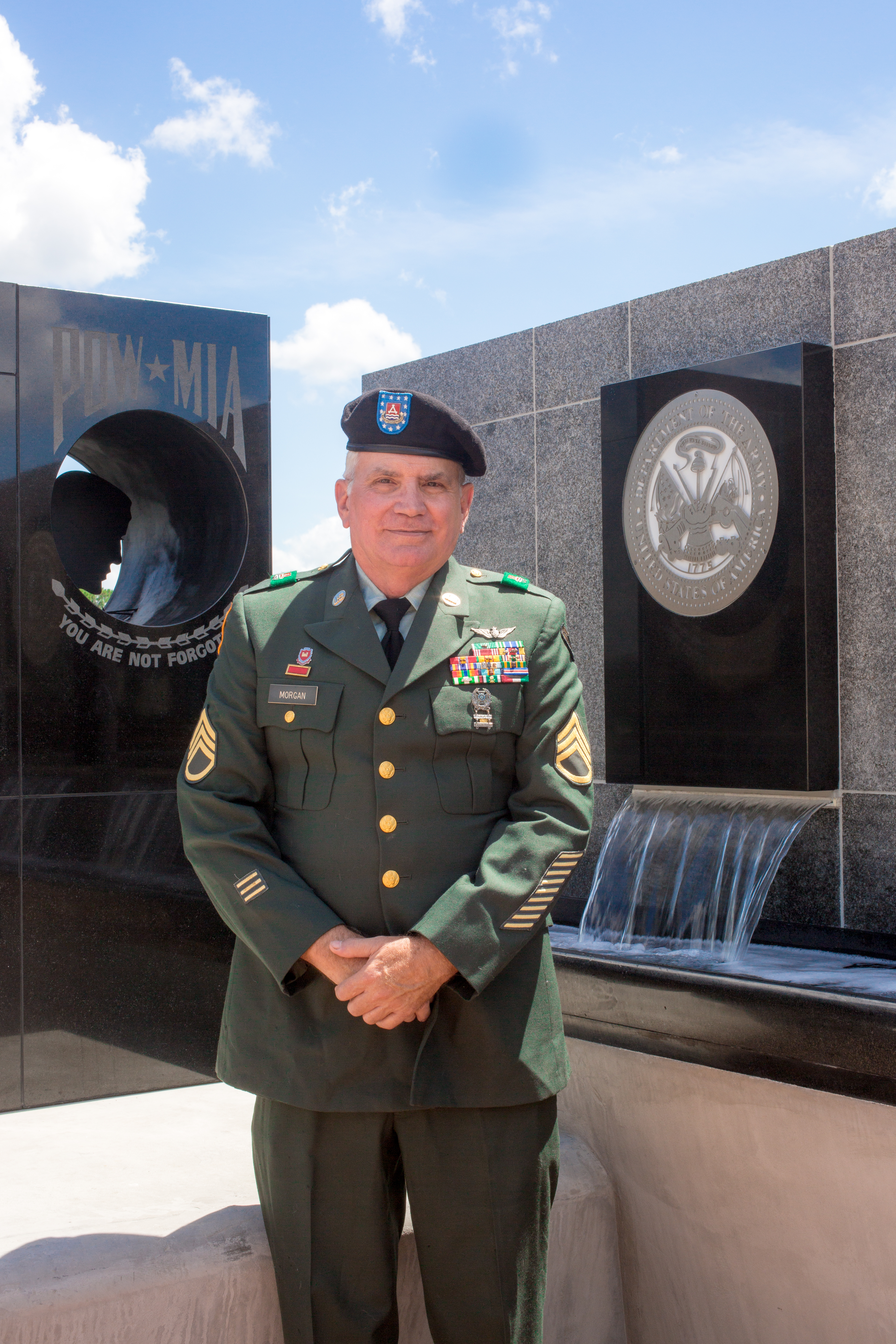Tucked away in a lot on East Orlando’s Tanner Road, under a flag waving in the wind of freedom, is a collection of memorabilia providing a tangible memory of war at the Corporal Larry E. Smedley National Vietnam War Museum.
Members of Vietnam & All Veterans of Central Florida (VAVCF) worked to get a helicopter from the war onto the property. This exact helicopter holds the memories of a humble, wise history connoisseur named Robert “Rusty” Morgan. Central Florida local his entire life, Morgan has lived in Orlando and Longwood, but he currently resides in Sanford.
Coming from a bloodline of veterans, it only made sense that he served the country just as his family did. Morgan remembers hearing war stories about his uncle, Luke Morgan, who was in the U.S. Army in the beginning of World War II. “He was there when the Japanese invaded the Philippines, was captured, and survived the death march,” says Morgan, adding that his uncle escaped but was recaptured, and eventually freed after the war.
Inspired by his family’s bravery, Morgan fought in the Vietnam War and Operation Desert Storm. He admits that the memories can be emotionally unforgettable, but he’s proud to tell his war stories. Morgan sips on iced tea while he unpacks his memories from a leather-bound photo album that tells the story of a conquered chapter of his life.
Stories from Vietnam
Morgan enlisted in the U.S. Army when he was 19 years old. “The draft was in effect. My number for that year was 124. The cutoff was 127, which meant the next year I would have gone anyway, and I didn’t want to be a grunt,” says Morgan. He remembers having to gain weight before he could start basic training.
Morgan arrived to Vietnam in 1971, right after Easter, ready to serve a full-year tour. He worked as a helicopter mechanic until he earned a position as a door gunner firing a M60D model machine gun. “I had a few interesting close calls and stuff. Well, the Army says three but I say four times shot down” he says.
He explains that the Army doesn’t count one incident because the helicopter still made it back to the base. “The tail rotor control shot away, and we ended up having to get it in like an airplane,” Morgan says. “Without the tail rotor, a helicopter won’t spin. We touched down at over 100 miles an hour.”
He remembers that one of his scariest close calls didn’t come from a barrage of bullets but instead from a single shot. “We were just flying along, next thing you know – in one door and out the other – a tracer came flying through. A 51-caliber. It didn’t touch, but we couldn’t tell where that thing came from and it was only one single shot,” he says. “That spooked us.”
Morgan remembers being thankful for weekly mail and monthly care packages from family members. “One thing I requested was a lot of Kool-Aid,” he says with a laugh.
Returning to Mixed Emotions
After putting their lives on the line in a war with more than 3 million American soldier deaths, returning soldiers didn’t exactly receive the warm welcome they expected. The “first television war,” as some call it, had left painful impressions on American citizens while they hopefully awaited the return of their family members, neighbors and friends. “You know, a lot of Vietnam vets were not treated very kindly by the public,” says Morgan. “I ended up on both sides of that.”
Morgan remembers taking a family friend’s daughter to her high school prom wearing formal military attire. He arrived at Disney’s Contemporary Resort, where respectful employees offered perks such as free parking and a free monorail ticket for him and his date. On the other hand, Morgan remembers fighting a man at a bar because the man was publicly disrespecting Vietnam veterans.
“It happened a lot because people didn’t see what soldiers saw,” says Courtney Mader, director of legal affairs at the Corporal Larry E. Smedley Vietnam War Museum. “There were a lot of good people who were protesting on political reasons and said there’s no reason for the U.S. to be there [in Vietnam], the soldiers shouldn’t be there. But then, coming back, you had a lot of people who were very nasty and cruel and blamed soldiers.”
Life After Vietnam
After the Vietnam War, Morgan recruited for a while before heading to Fort Campbell, where he did heavy maintenance for the area. He returned home in October of 1973 and was in the Individual Ready Reserve until 1976. During this time, he had various jobs, one of which was a forest ranger and another with the Orlando Fire Department. Eventually, Morgan decided to utilize the GI Bill to earn an education in auto mechanics, which he put to use until he joined the Reserves in 1980 to earn an extra paycheck.
Morgan also served in Desert Storm, making him a two-war veteran. Operation Desert Storm, popularly known as the first Gulf War, freed Kuwait from Suddam Hussein’s rule and resulted in fewer than 150 battle deaths. Morgan remembers a moment during a parade in honor of Desert Storm soldiers, when fellow pilot, Pete Conely, turned to him and said, “This time we were saving lives, not taking them.”
Morgan became involved with the Corporal Larry E. Smedley National Vietnam War Museum in 1997 through VAVCF. He says it has been a rewarding experience to contribute 12 years as a volunteer director, where he also helped out with school tours visiting the museum. Morgan remembers a time when an 11-year-old girl asked him, “What’s the hardest thing you’ve ever had to do?” He explained that everyone is told not to kill, but in combat it is otherwise. She looked to him with eyes of unsettled understanding.
With two war chapters in his life’s story, and a memory bank full of combat experiences, there is one thing that Morgan is sure of. “Soldiers deserve remembrance,” he says.







Comments